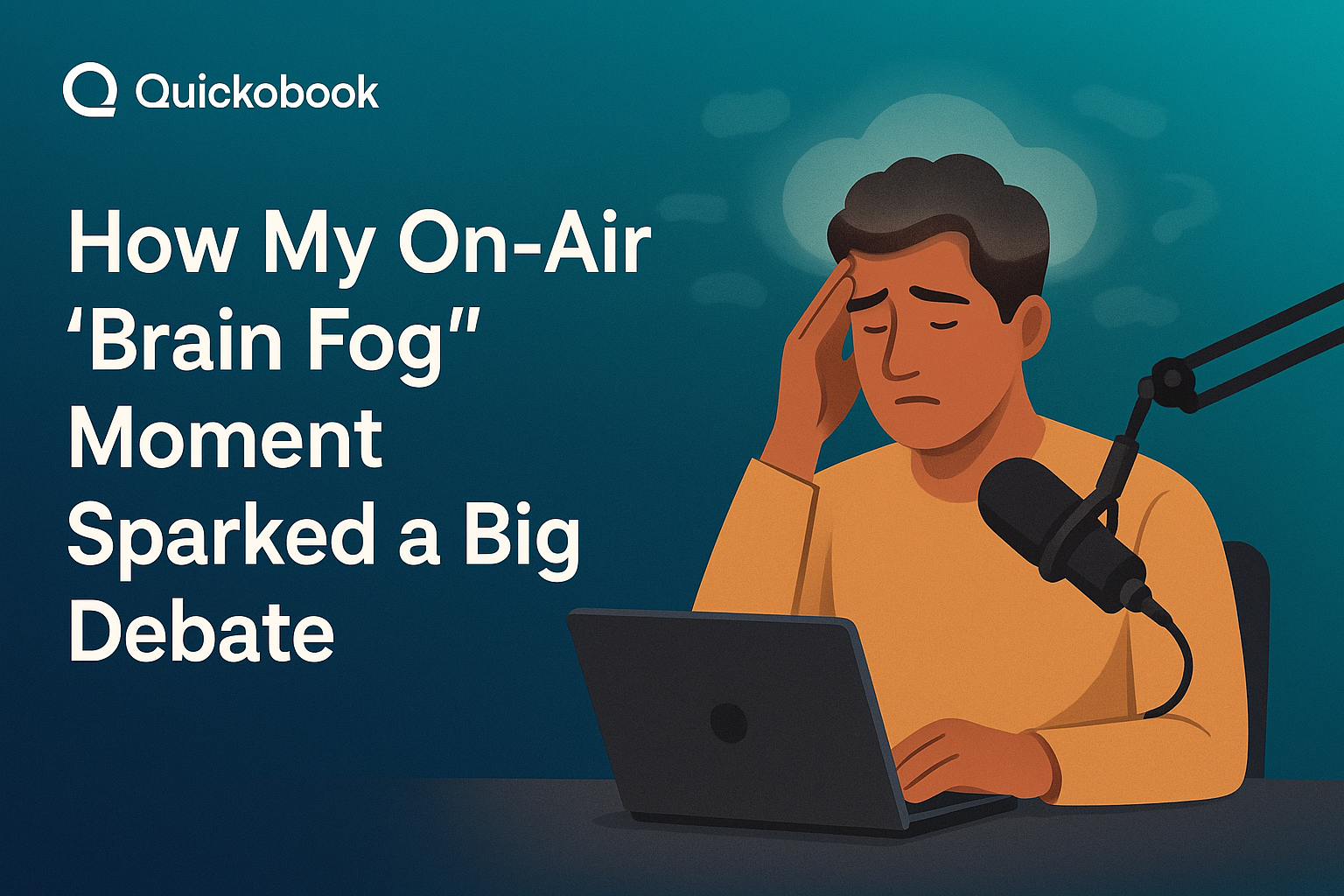Introduction
It was supposed to be a normal broadcast day. The cameras rolled, the lights warmed up, and I began speaking—until my mind suddenly went blank. A strange pause. A sentence left hanging mid-air. A moment of complete brain fog on live TV.
Within minutes, the clip went viral. Some viewers joked. Some expressed concern. Many related to it. What followed was a powerful, much-needed debate across India about overwork, stress, and the hidden mental load so many people carry.
Brain fog isn't a medical diagnosis by itself. It’s a symptom—often triggered by stress, burnout, overwork, poor sleep, anxiety, illnesses, or nutritional deficiencies. And my small on-air moment opened the doors for thousands to share their own.
This guide will help you understand brain fog, its causes, symptoms, treatments, prevention, and why taking mental health seriously is essential today.

What Is Brain Fog?
Brain fog refers to a state of mental cloudiness, confusion, or difficulty thinking clearly. People often describe it as:
-
“My mind feels heavy.”
-
“I can’t think straight.”
-
“I know what I want to say but the words don’t come out.”
Brain fog itself is not a disease—it is a signal from your body and brain.
Why My On-Air Brain Fog Moment Hit a Nerve
Millions of Indians experience similar moments daily: forgetting names, losing track mid-sentence, blanking out during meetings, or struggling to focus. But many ignore it because:
-
Overwork is normalized
-
Stress is considered “part of life”
-
Mental health conversations still feel uncomfortable
-
Sleep deprivation is glorified as productivity
A single on-air pause turned into a nationwide conversation about how the human brain responds when pushed too far.
Causes of Brain Fog
Brain fog can happen due to one or more factors. Here are the most common:
1. Overwork
Long working hours, tight deadlines, and lack of breaks overload the brain’s processing ability. Over time, cognitive fatigue sets in.
2. Stress & Anxiety
Chronic stress triggers cortisol release, affecting memory, focus, and decision-making.
3. Sleep Deprivation
Sleeping less than 6–7 hours regularly disrupts brain function.
4. Nutritional Deficiencies
Low levels of vitamin B12, iron, vitamin D, omega-3, and folate impair concentration.
5. Hormonal Changes
Thyroid imbalance, menopause, and postpartum changes can cause mental fogginess.
6. Dehydration
Even mild dehydration can affect cognition.
7. Medications
Some medicines (antihistamines, sedatives, antidepressants) may contribute.
8. Medical Conditions
-
Thyroid disorders
-
Diabetes
-
PCOS
-
Post-COVID syndrome
-
Autoimmune disorders
-
Depression
9. Poor Lifestyle Habits
Skipping meals, excessive caffeine, lack of exercise, and irregular routines worsen cognitive clarity.
ALSO READ: 3 Common (and Dangerous) Mistakes That Over Time Can Damage The Kidneys
Symptoms of Brain Fog
You may experience:
-
Difficulty concentrating
-
Forgetting words mid-sentence
-
Slow thinking
-
Confusion
-
Poor memory
-
Lack of mental energy
-
Trouble multitasking
-
Irritability
Diagnosis: How Doctors Evaluate Brain Fog
Doctors begin with a:
1. Medical History Review
Questions about stress, sleep, diet, work hours, medications, and emotional health.
2. Physical Examination
To rule out thyroid, neurological, or metabolic issues.
3. Lab Tests
Depending on symptoms:
-
CBC
-
Thyroid panel
-
Vitamin B12
-
Vitamin D
-
Blood sugar levels
-
Iron studies
4. Mental Health Screening
To check for anxiety, depression, or burnout.
Diagnosis focuses on finding the root cause rather than just treating the symptom.

Treatment Options for Brain Fog
1. Managing Overwork
-
Limit long hours
-
Take micro-breaks
-
Use productivity cycles
-
Maintain work-life balance
2. Stress Management
-
Deep breathing
-
Mindfulness
-
Counseling
-
Yoga
3. Sleep Improvement
-
7–9 hours of restful sleep
-
Avoid screens before bed
-
Maintain a regular sleep schedule
4. Nutrition Support
A doctor may recommend supplements only after testing, such as:
-
Vitamin B12
-
Vitamin D
-
Iron
-
Omega-3 fatty acids
(Do not self-medicate. Dosage must be prescribed by a doctor.)
5. Treating Underlying Conditions
If due to thyroid, diabetes, or anxiety disorders, managing the root condition often improves fogginess.
6. Hydration
2–3 litres of water per day (adjust based on climate/needs).
Lifestyle Changes to Reduce Brain Fog
Daily Tips
-
Take a 5-minute break every hour
-
Do brain-stimulating activities
-
Stay hydrated
-
Balanced meals with protein + vegetables
-
Reduce caffeine after evening
Workplace Adjustments
-
Avoid multitasking
-
Organize tasks by priority
-
Use planners or digital reminders
-
Ask for help when workload spikes
Prevention: How to Avoid Future Brain Fog Episodes
Maintain a consistent sleep cycle
-
Reduce chronic stress
-
Set boundaries at work
-
Eat nutrient-rich meals
-
Stay physically active
-
Schedule yearly health check-ups

When to See a Doctor
Visit a doctor if brain fog is:
-
Frequent or worsening
-
Impacting daily performance
-
Accompanied by severe fatigue
-
Affecting speech or movement
-
Causing memory gaps
-
Occurring after illness (e.g., COVID-19)
Risks & Complications
Ignoring brain fog may lead to:
-
Burnout
-
Anxiety or depression
-
Reduced productivity
-
Increased mistakes at work
-
Decline in quality of life
-
Chronic fatigue syndrome
Conclusion
My on-air brain fog moment wasn’t a failure—it was a wake-up call. For me, and for thousands of people who saw themselves in that pause. Brain fog is a sign that the brain needs rest, nourishment, and balance. It’s not something to hide or feel embarrassed about.
Prioritizing mental health, addressing overwork, and listening to your body can prevent small moments from becoming major problems. If you’ve been experiencing similar issues, you’re not alone—help is available, and recovery is possible.
50 FAQs
-
What is brain fog?
A state of mental confusion, slow thinking, or difficulty focusing. It is a symptom, not a disease. -
Can overwork cause brain fog?
Yes, overwork is one of the leading causes due to mental fatigue. -
Is brain fog a sign of anxiety?
It can be. Anxiety affects focus and increases mental load. -
Is brain fog dangerous?
Not usually, but it can signal an underlying health issue. -
Does brain fog mean I’m getting dementia?
No. Brain fog is usually temporary and related to lifestyle factors. -
Can lack of sleep cause brain fog?
Yes, sleep deprivation reduces cognitive performance. -
How long does brain fog last?
It varies—from hours to weeks depending on the cause. -
Can dehydration cause brain fog?
Even mild dehydration affects clarity and focus. -
Does brain fog affect speech?
Sometimes you may pause, forget words, or struggle to articulate. -
Can stress trigger brain fog?
Yes, chronic stress is one of the major causes. -
Is brain fog common in India?
Yes, especially due to long working hours and lifestyle stress. -
Can vitamin deficiency cause brain fog?
Low B12, vitamin D, or iron levels can contribute. -
Can thyroid issues cause brain fog?
Hypothyroidism is a common cause of cognitive slowing. -
Can I treat brain fog at home?
Yes—sleep, hydration, stress reduction, and nutrition help. -
Should I see a neurologist for brain fog?
Only if symptoms persist or worsen. -
Can smartphones cause brain fog?
Excessive screen time affects attention and sleep. -
Does caffeine worsen brain fog?
Too much caffeine can cause crashes and worsen fog. -
Can COVID-19 cause brain fog?
Yes, post-COVID brain fog is widely reported. -
Is brain fog related to depression?
Depression can slow thinking and reduce concentration. -
Can diet affect brain fog?
Skipping meals or eating poorly can reduce mental clarity. -
Does overthinking cause brain fog?
Yes, it mentally exhausts the brain. -
Can allergies cause brain fog?
Yes, nasal congestion and antihistamines may contribute. -
How much water should I drink?
At least 2–3 litres daily depending on climate. -
Does exercise help brain fog?
Yes, it boosts blood flow and brain function. -
Can brain fog cause headaches?
Sometimes they occur together due to stress or fatigue. -
Can hormonal imbalance cause brain fog?
Thyroid, menopause, and PCOS can all trigger fogginess. -
Can multitasking cause brain fog?
Yes, it overloads the brain. -
Can skipping breakfast lead to brain fog?
Low glucose levels reduce concentration. -
Does meditation help brain fog?
Yes, it improves focus and reduces stress. -
Is brain fog temporary?
Most cases are temporary and reversible. -
Can pregnancy cause brain fog?
Yes, hormonal changes can affect memory. -
Can medication cause brain fog?
Some medicines have cognitive side effects. -
Can anemia cause brain fog?
Low iron reduces oxygen supply to the brain. -
Does aging cause brain fog?
Mild slowing is normal, but severe fog needs evaluation. -
Can screen addiction cause brain fog?
Yes, it strains attention and sleep cycles. -
Can brain fog affect job performance?
Yes, it reduces productivity and focus. -
Is brain fog linked to burnout?
Burnout is one of its most common causes. -
Can low vitamin D cause brain fog?
Yes, deficiency is associated with cognitive issues. -
Does sugar intake affect brain fog?
High sugar causes crashes that impair focus. -
Can brain fog cause dizziness?
Sometimes they appear together due to fatigue. -
Can poor air quality cause brain fog?
Pollution affects oxygen levels and cognitive performance. -
Can brain fog affect memory?
Yes, short-term memory may feel weak. -
Is brain fog more common in women?
Hormonal changes can make it more frequent. -
Can IBS or gut issues cause brain fog?
Gut-brain connection can affect clarity. -
Is brain fog treatable?
Yes, once the cause is identified. -
Can brain fog return?
Yes, if triggers like stress or poor sleep continue. -
Does drinking alcohol cause brain fog?
Alcohol disrupts sleep and cognition. -
Can brain fog cause panic attacks?
It may worsen anxiety but is not a direct cause. -
Should I get a health check-up for brain fog?
Yes, especially if it’s frequent. -
Can therapy help with brain fog?
Yes—therapy helps manage stress, burnout, and emotional load.
Quickobook CTAs
-
Book an appointment with a nearby general physician on Quickobook for stress, fatigue, or brain fog evaluation.
-
Find a psychologist or psychiatrist near you through Quickobook for counseling or mental health support.
-
Use Quickobook teleconsultation for convenient at-home medical guidance.
Disclaimer
This blog is for educational purposes only and should not replace professional medical advice. Always consult a qualified doctor before starting or changing any treatment, medication, or supplement.









Comments (0)
No comments yet. Be the first to share your thoughts!
Leave a Comment